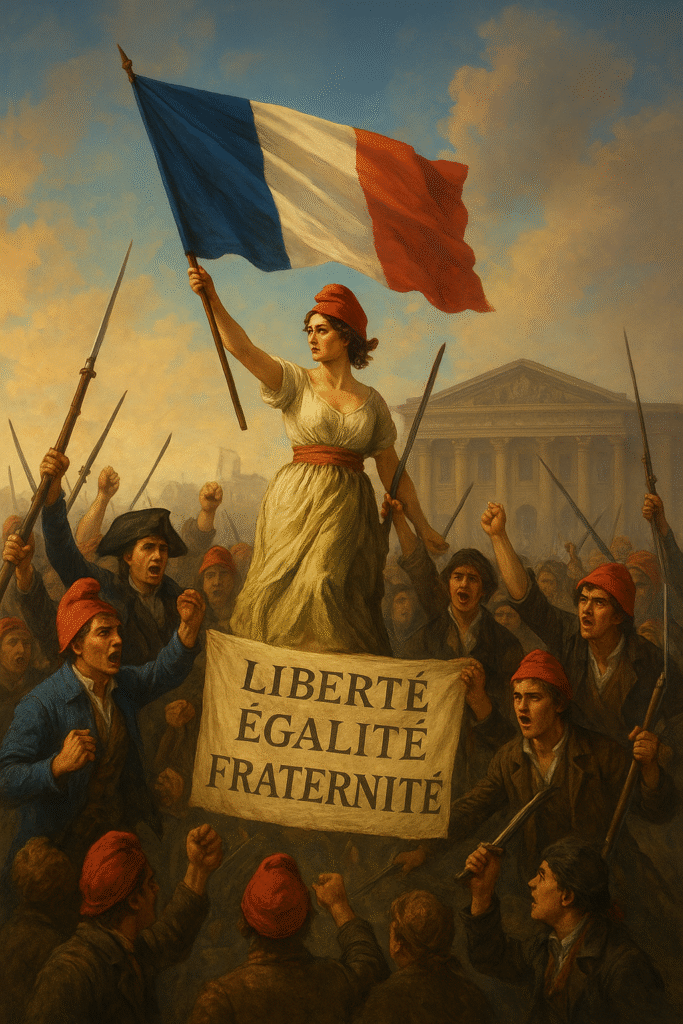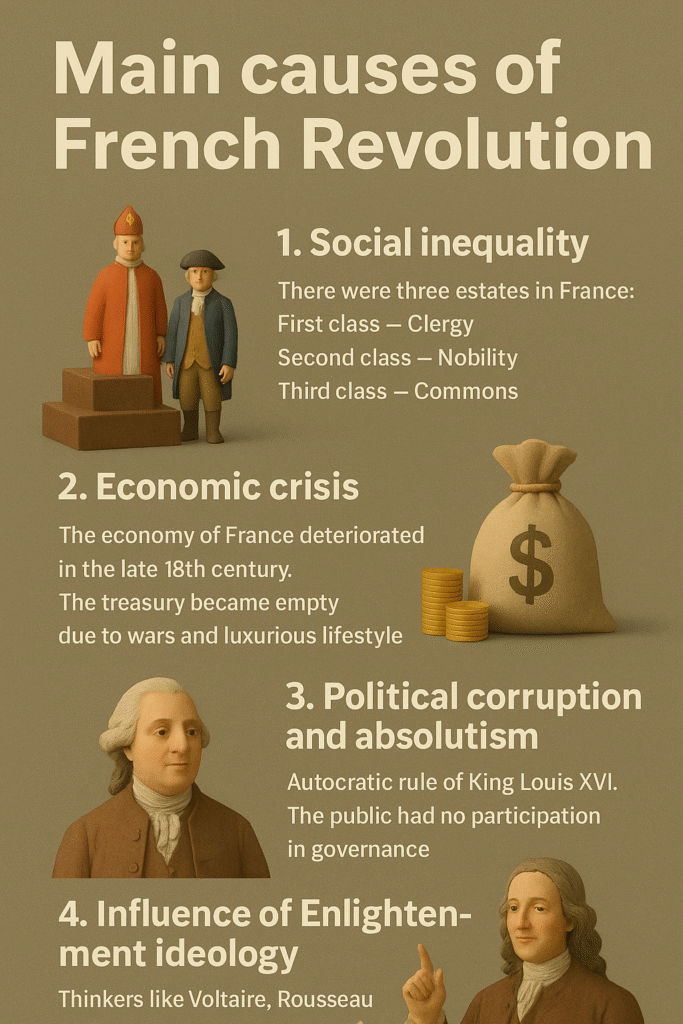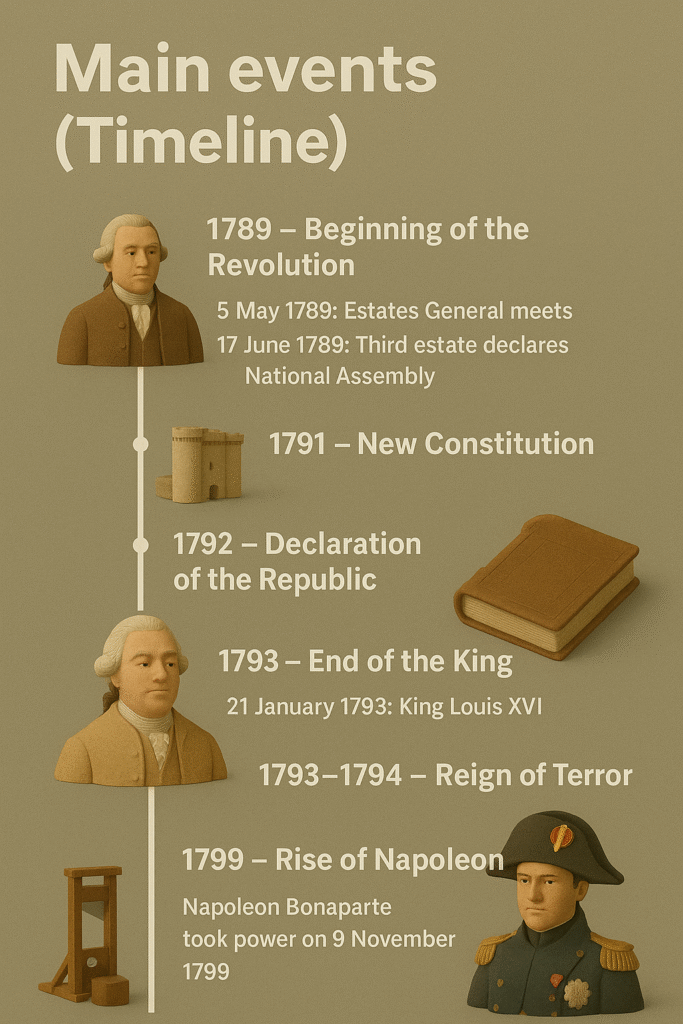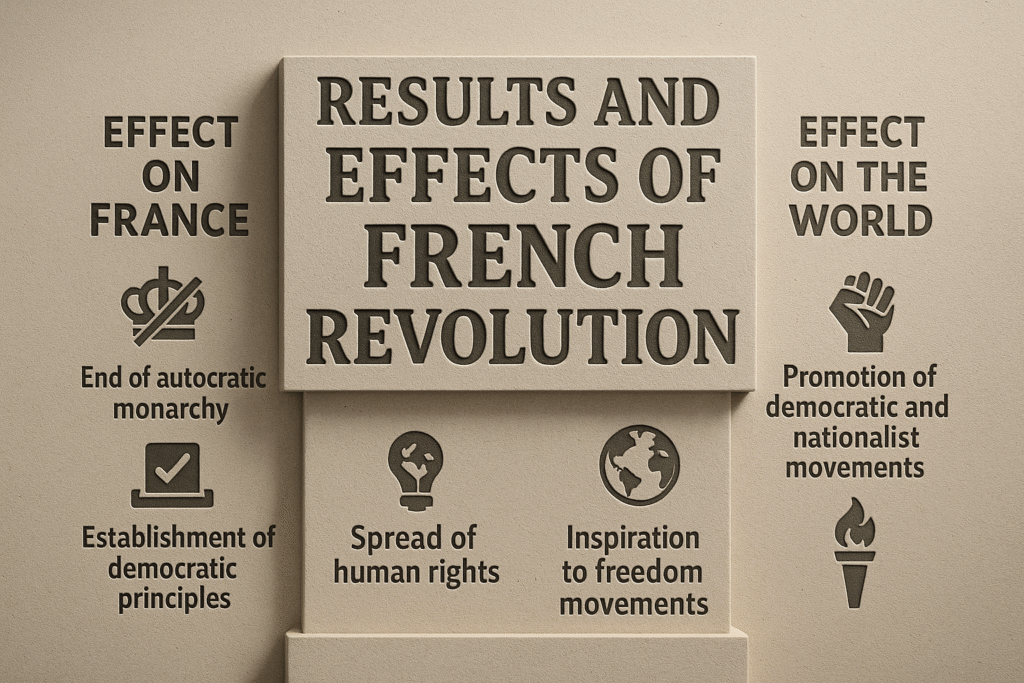
French Revolution (1789) – Causes, Events, Effects and History
Introduction
The French Revolution was a historic event that lasted from 1789 to 1799, which completely changed the politics, society and economy of France. This revolution established the principle of “Liberty, Equality, Fraternity” in the minds of the people and laid the foundation of modern democracy.
Main causes of the French Revolution
- Social inequality
- There were three estates in France:
- First class – Clergy
- Second class – Nobility
- Third class – Commons
- The first and second classes were exempted from taxes, while heavy taxes were imposed on the third class.
- Economic crisis
- The treasury became empty due to wars and luxurious lifestyle.
- Cooperation in the American War of Independence also increased the economic burden.
- Political corruption and absolutism
- Absolutist rule of King Louis XVI.
- People were not given any participation in governance.
- Influence of Enlightenment era
- Thinkers like Voltaire, Rousseau and Montesquieu preached democracy and human rights.
Main events (Timeline)
1789 – Beginning of the Revolution
- May 5: Estates-General convened.
- June 17: Third estate declared itself the National Assembly.
- July 14: Attack on Bastille – symbolic beginning of the revolution.
1791 – New Constitution - Constitution limiting the powers of the monarchy implemented.
1792 – Declaration of the Republic - France was declared a republic and monarchy ended.
1793 – End of the King - 21 January: King Louis XVI sentenced to death.
- Queen Marie Antoinette also hanged.
1793–1794 – Reign of Terror - Thousands of people led by Robespierre were declared anti-revolutionary and hanged.
1799 – Rise of Napoleon - 9 November: Napoleon Bonaparte takes power, end of the revolution.
Results and Effects of the French Revolution
- Effect on France
- End of autocratic monarchy.
- Establishment of democratic principles.
- End of feudal system.
- Effect on the world
- Promotion of democratic movements in Europe and the world.
- Spread of the ideology of human rights and freedom.
- Inspiration for independence in the colonies.
Important Facts (Exam Notes)
- Slogan: Liberty, Equality, Fraternity
- Symbol: Bastille Day (14 July) – National Day of France.
- Major Leaders: Robespierre, Danton, Mirabeau, Napoleon Bonaparte.
Conclusion
The French Revolution was not only a political change in France, but it was a turning point in world history that laid the foundation of the modern democratic system. Its ideals are still alive in the constitutions and societies of the world.
Main Causes of The French Revolution
The French Revolution (1789) was the result of many deep social, economic, political and ideological reasons. Its main reasons are given below:
- Social Inequality
- There was a three estate system in France:
- First class (Clergy) – The clergy class, who had special rights and exemption from taxes.
- Second class (Nobility) – Feudal lords and nobles, who had vast lands and they also did not have to pay taxes.
- Third class (Commoners) – Farmers, laborers, traders and intellectuals, who paid the highest taxes and got the least rights.
- This unequal system increased discontent among the people.
- Economic Crisis
- By the end of the 18th century, the treasury of France was empty.
- Heavy expenditure on helping in the American War of Independence and continuous wars.
- Luxurious lifestyle of the king and the court.
- Life became difficult due to rising taxes and inflation on the public.
- Political Absolutism
- Complete autocratic rule of King Louis XVI.
- People did not have the right to participate in governance.
- Corruption and disorder in administration.
- Impact of Enlightenment
- Thinkers Voltaire, Rousseau, Montesquieu spread the ideas of freedom, equality and democracy.
- These ideas inspired the public to rise against autocratic rule.
- Other Immediate Causes
- Bad harvest and famine in 1788–1789.
- People on the verge of starvation due to rising prices of bread.
- Ignoring the third estate in the meeting of the Estate General. ____________________________
📌 In short – social injustice, economic crisis, political corruption and the influence of new ideologies were the biggest reasons behind the French Revolution.

Social Inequality
The biggest reason for the French Revolution was social inequality. At that time, the society in France was divided into three estates—
- First class (Clergy)
o Church officials and religious leaders.
o They had special privileges and did not pay any kind of tax.
o They owned a large part of the country’s land.
- Second class (Nobility)
o Feudal lords and high officials associated with the king’s court.
o They also had complete exemption from taxes.
o They collected rent from the farmers, but did nothing in the interest of the public.
- Third class (Commoners)
o It included farmers, laborers, traders, artisans and intellectuals.
o More than 90% of the country’s population was in this class.
o They had to pay the highest taxes, while political and social rights were almost negligible.
📌 Conclusion – Due to tax exemption and privileges of the first and second classes, dissatisfaction grew in the third class, which ultimately became the main cause of the revolution.
Financial Crisis
The second major cause of the French Revolution was the severe economic crisis, which made the life of the common people extremely difficult.
Main Reasons:
- Excessive expenditure on wars
o France fought many expensive wars, the most prominent of which was helping America against Britain in the American War of Independence (1775–1783).
o Huge money was spent on these wars, which emptied the country’s treasury.
- Luxury of the King and the Court
o King Louis XVI and Queen Marie Antoinette lived a life of extreme luxury.
o Crores were spent on expensive palaces, feasts and royal parties, while the public was struggling with hunger.
- Unjust policy of the tax system
o The burden of tax was only on the third class (common people).
o The first and second classes were completely exempted from tax.
- Bad harvest and famine
o Bad weather in 1788 and 1789 led to a decrease in wheat production.
o The prices of bread increased, making it difficult for the poor to procure food.
- Burden of government debt
o The government became heavily indebted, to repay which taxes were further increased.
o This increased tax also had to be paid only by the third class.
📌 Conclusion – War expenses, royal luxuries, unjust tax system and bad harvest deepened the economic crisis so much that the feeling of rebellion increased among the common people.
Political Corruption and Autocracy
Another major reason for the French Revolution was the political system being corrupt and autocratic.
Main points:
- Absolute autocratic monarchy
o The system of governance in France was Absolute Monarchy, in which the king had full authority.
o King Louis XVI did not take anyone’s opinion in his decisions.
- Lack of public participation in governance
o The general public had no right to make laws or on government policies.
o No democratic institution like the Parliament was working effectively.
- Corruption and favoritism
o Corruption was rampant in the royal court and administration.
o Appointments to high positions were made on the basis of kinship and flattery rather than merit.
- Repressive policies
o Those who raised the voice of revolution were punished.
o There were strict restrictions on freedom of press and expression.
- Neglect of Estates General
o The Estates General (the representative assembly of France) was not convened for about 175 years after 1614.
o Even when it was convened in 1789, the demands of the third estate were ignored.
📌 Conclusion – The autocratic rule of the king, suppression of the voice of the public, and corruption in the administration created deep discontent among the people, which became an important cause of the revolution.
Influence of The Enlightenment Era
The Enlightenment Era also had a profound influence behind the French Revolution. It was an intellectual and philosophical movement spread in Europe in the 17th and 18th centuries, which introduced people to the ideas of logic, science, freedom and equality.
Main Points:
- Contribution of thinkers
o Voltaire – Emphasized on religious tolerance, freedom of expression and logic.
o Jean-Jacques Rousseau – Explained in “Social Contract” that power should be in the hands of the people, not the king.
o Montesquieu – Gave the principle of separation of powers, which could strengthen democratic rule.
- Public awareness
o Through books, pamphlets and discussions, these ideas made the general public aware.
o People started thinking that autocratic monarchy and social inequality are unjust.
- Desire for freedom and equality
o The ideas of the Enlightenment era strengthened the aspiration of people to get personal freedom and equal rights.
o This inspired the peasants, workers and the middle class to revolution. - Effect of other revolutions
o The victory in the American War of Independence (1776) proved that the principles of the Enlightenment could be applied practically.
o This increased the confidence of the people of France.
📌 Conclusion – The ideas of the Enlightenment era made the people of France realize that they too are entitled to equality, freedom and democratic rule. This intellectual revolution eventually turned into a political revolution.
The Beginning of The French Revolution: Main Events

1789 – Beginning of the Revolution
- 5 May 1789 – King Louis XVI called a meeting of the Estates-General to solve the economic crisis.
- 17 June 1789 – The third estate (Commoners) declared themselves the National Assembly and pledged to make a constitution.
- 20 June 1789 – Tennis Court Oath – The members of the National Assembly pledged that they would not separate until a new constitution was made.
- 14 July 1789 – The public attacked the Bastille Fort, which is considered the symbolic beginning of the Revolution.
- August 1789 – Feudal System ended and Declaration of the Rights of Man and of the Citizen passed.
1791 – New Constitution
- France’s first written constitution came into force.
- The powers of the king were limited and a constitutional monarchy was established.
1792 – Declaration of the Republic
- War between France and Austria-Prussia began.
- 21 September 1792 – Monarchy was abolished and a republic was declared.
1793 – End of the King and Reign of Terror
- 21 January 1793 – King Louis XVI was sentenced to death by guillotine.
- Queen Marie Antoinette was also hanged.
- 1793–1794 – The “Reign of Terror” was led by Robespierre, in which thousands of people were hanged on charges of being anti-revolution.
1794 – End of the Reign of Terror
- Robespierre and his supporters were hanged in July 1794.
- The revolution took a liberal turn.
1795 – New Constitution
- A new constitution came into force and a five-member executive council called the Directory was formed.
1799 – Rise of Napoleon
- 9 November 1799 – Napoleon Bonaparte staged a coup and took power.
- This marked the end of the French Revolution and the beginning of the Napoleonic era.
📌 Conclusion – The French Revolution between 1789 and 1799 abolished monarchy, laid the foundation for democratic principles and spread the ideas of liberty and equality throughout the world.
1789 – The Revolution Begins
1789 proved to be a watershed in the history of France, as the French Revolution began in this year. This year became a symbol of public revolt against political discontent, economic crisis and social injustice.
Main events:
- 5 May 1789 – Meeting of the Estates-General
o King Louis XVI called a meeting of the Estates-General to solve the severe economic crisis of France.
o Representatives of all three classes participated in it- the first class (Clergy), second class (Nobility) and third class (Commoners).
o Representatives of the third class demanded that voting should be done “on the basis of person” and not “on the basis of class”, so that the voice of the common people could be heard. - 17 June 1789 – Formation of the National Assembly
o The third class declared itself the National Assembly.
o They resolved to make a constitution, which would limit the powers of the king and give rights to the people. - 20 June 1789 – Tennis Court Oath
o When the members of the third estate were thrown out of the assembly hall, they gathered in a nearby tennis court.
o They took an oath that they would not separate until a new constitution was made. - 14 July 1789 – Attack on Bastille Fort
o The people of Paris attacked the Bastille prison and freed the political prisoners imprisoned there.
o The capture of Bastille became a symbol of public anger and demand for freedom.
o Even today, 14 July is celebrated as “National Day” (Bastille Day) in France. - August 1789 – End of feudal system
o The National Assembly abolished feudal privileges.
o The “Declaration of the Rights of Man and of the Citizen” was passed, which guaranteed equality, freedom and rights.
📌 Conclusion – The events of 1789 took the first step towards the end of monarchy in France and laying the foundation of democracy. This year became a symbol of the zeal of revolution and the power of the people.
1791 – New Constitution
The year 1791 was an important stage in the French Revolution, as this year the first written constitution of France came into force. This constitution completely changed the governance system of the country and limited the autocratic powers of the king.
Main events:
- Establishment of Constitutional Monarchy
o The Constitution of 1791 established Constitutional Monarchy in France.
o Now the king was only the head of the state, while the real power came into the hands of the elected representatives of the people. - Division of Power
o The constitution divided the governance into three parts:
Executive – King and Council of Ministers.
Legislature – Unicameral Assembly, which was elected by the people.
Judiciary – Independent Court.
- Voting Rights
o Only “active citizens” got the right to vote. o Active citizens were those who paid taxes and owned a certain amount of property, due to which the poor class was deprived of voting. - Confirmation of human and civil rights
o The Declaration of the Rights of Man and of the Citizen, passed in 1789, was included in the Constitution.
o It guaranteed liberty, equality, freedom of expression and equality before the law.
- King’s escape attempt (Flight to Varennes)
o In June 1791, King Louis XVI and Queen Marie Antoinette tried to escape from France secretly, but were caught at a place called Varennes.
o This incident further increased the distrust of the king among the public.
📌 Conclusion – The Constitution of 1791 was the foundation of the democratic history of France. Although it had limited voting rights, it still took an important step towards ending the autocratic monarchy and giving power to the people.
1792 – Declaration of the Republic
The year 1792 proved to be a turning point in the French Revolution, because in this year the monarchy ended and France was declared a republic. This was the time when the people completely rejected the power of the king and the rule of the country came into the hands of the elected representatives of the people.
Main events:
- Beginning of the war
o In April 1792, France waged war against Austria and Prussia.
o The purpose of the war was to protect the revolution and spread democratic ideas in Europe.
o But initially France had to face many defeats, which increased discontent among the people.
- 10 August 1792 – Attack on Tuileries Palace
o The people of Paris attacked the Tuileries Palace, where King Louis XVI was living.
o The king was imprisoned and his political powers were abolished.
- September Massacres
o Thousands of prisoners were murdered in Paris due to rumours and fear, who were considered anti-revolutionary.
o This incident shows the violent direction of the revolution. - 21 September 1792 – Declaration of the Republic
o The National Convention decided to end the monarchy.
o The First French Republic was established on the same day. - Trial of the King
o Louis XVI was accused of treason and preparations began for his trial, which ended with his death sentence in 1793.
📌 Conclusion – The declaration of the Republic in 1792 completely freed France from monarchy. This year clearly took the direction of the revolution towards democratic rule, although violence and war made it more fierce.
1793 – The End of The King
The year 1793 was the most dramatic and decisive phase of the French Revolution, as it was the year King Louis XVI died and the revolution moved towards its most violent form – the Reign of Terror.
Main events:
- Trial of the King
o After the declaration of the Republic, the National Convention accused King Louis XVI of treason.
o During the trial, the king was proved to have contacted foreign powers and conspired against France.
- 21 January 1793 – Death sentence of the king
o The king was publicly hanged by guillotine.
o This incident went down in French history as a symbolic end to the monarchy.
- Reaction in Europe
o The king’s execution spread fear in other monarchies of Europe.
o Many countries, including Britain, Spain, the Netherlands and Austria, declared war on France. 4. Beginning of the Reign of Terror
o Maximilien Robespierre and the Jacobin Party took harsh measures to eliminate anti-revolutionary forces.
o Thousands of people were executed, including Queen Marie Antoinette.
- Political instability
o Instability increased in the country due to civil war, external war and anti-revolutionary activities.
o The army was strengthened and harsh laws were made to protect the ideals of the revolution.
📌 Conclusion – The execution of the king in 1793 completely separated France from monarchy, but with this the country entered a period of violence and fear. This year became a symbol of tyranny and radical politics in the name of protecting the ideals of the revolution.
1793–1794 – Reign of Terror
The period from 1793 to 1794 was the bloodiest and fiercest phase of the French Revolution, which is called the Reign of Terror. During this period, thousands of people were killed in the name of protecting the revolution and an atmosphere of fear prevailed throughout the country.
Background:
- After the execution of King Louis XVI (January 1793), many countries of Europe declared war against France.
- Civil war and anti-revolutionary rebellions (such as the Vande rebellion) also started within the country.
- In this situation, the revolutionary leaders decided to take tough steps.
Main features:
- Dominance of the Jacobin Party
o The Jacobin Party, led by Maximilien Robespierre, took power in its hands.
o All those considered anti-revolutionary were arrested and punished.
- Fear of the Guillotine
o The guillotine became the most notorious symbol of the Revolution.
o In just one year, about 16,000 people were publicly hanged and more than 2,00,000 were imprisoned.
o The dead included Queen Marie Antoinette, revolutionary leaders George Danton and Camille Desmoulins. - Strict Laws
o The “Law of Suspects” was implemented, under which people could be arrested even on the slightest suspicion.
o Strict restrictions were imposed on freedom of the press, expression and assembly. - Economic and Social Changes
o Price controls were imposed on grain and essential commodities.
o Land was redistributed to the peasants.
o Attempts were made to eliminate religious symbols and traditions to reduce the power of the Church. - Fall of Robespierre
o In July 1794, leaders dissatisfied with the growing terror of Robespierre revolted against him.
o On 27 July 1794 (9 Thermidor) Robespierre was arrested and executed by guillotine.
📌 Conclusion – The Reign of Terror was a period of fear and violence in the name of protecting the Revolution. Although some social and economic reforms took place during this time, widespread massacres and harsh policies tarnished the ideals of the Revolution.
1799 – Rise of Napoleon and End of The Revolution
The year 1799 was the last phase of the French Revolution, in which Napoleon Bonaparte took power in his hands, ended the revolution and brought France into a new era. This was the time when the political instability, war and power struggle that had been going on for ten years came to an end.
Background:
- After the fall of Robespierre in 1794, a government called the Directory was established.
- The Directory was struggling with corruption, economic crisis and political instability.
- Meanwhile, Napoleon Bonaparte emerged as a successful military commander, who showed his talent in the Italy and Egypt campaigns.
Main events:
- Political instability and public displeasure
o The Directory was not meeting the expectations of the public.
o The public was troubled by inflation, unemployment and war, which intensified the demand for change.
- 9 November 1799 (Coup d’état)
o Napoleon, with the help of his supporters, staged a coup d’état in Paris.
o The Directory was dissolved and a new government called the Consulate was formed, with Napoleon as the First Consul. - Expansion of Napoleon’s power
o Napoleon introduced administrative reforms, changed the judicial system and reorganized the army.
o He concentrated executive and military powers in his hands. - End of the Revolution
o The French Revolution is considered to have ended with Napoleon’s rise to power in 1799.
o Although the ideals of the Revolution – liberty, equality and fraternity – were not completely lost, political power was now in the hands of a strong leader rather than the people.
📌 Conclusion – Napoleon’s rise in 1799 took France out of the era of monarchy, republic and terror and led to a military-controlled stable rule. He maintained some of the ideals of the Revolution, but also laid the foundations for his totalitarian rule, which eventually made him emperor.
Results and Effects of The French Revolution
The French Revolution (1789–1799) changed the course of history not only in France but in the entire world. It brought about profound changes at the political, social, economic and cultural levels, which were felt for centuries to come.
- Political effects
(a) End of absolute monarchy
- The centuries-old absolutist power of the Bourbon dynasty came to an end.
- A republic was established in place of the monarchy and the people got the right to participate in governance.
(b) Spread of democratic ideas
- Ideals like liberty, equality and fraternity became popular all over the world.
- Later, democratic movements were inspired in America, Italy, Germany and Latin America.
- Social effects
(a) End of feudal system
- The privileges of the feudal lords and the clergy were abolished.
- The peasants got ownership of land and were freed from taxes and bonded labour.
(b) Establishment of social equality
- All citizens became equal before the law.
- Privileges based on birth and lineage were abolished.
- Economic effects
(a) Reforms in the tax system
- The old system of tax collection was abolished and uniform taxation was implemented.
- Transparency was brought in the state revenue.
(b) Development of capitalist system - Trade and industry were freed from government restrictions to a great extent.
- The right to private property got legal protection.
- Cultural and intellectual effects
(a) Victory of the ideas of the Enlightenment era
- The ideas of philosophers like Voltaire, Rousseau, Montesquieu were put into practice.
- Education, science and art got encouragement.
(b) Expansion of secularism - The power and influence of the church was limited.
- A step was taken towards a clear division between the state and religion.
- International impact
(a) Wave of revolution in Europe
- Inspired by the French Revolution, rebellion and reform movements began in many countries of Europe.
- The ideals of the revolution spread across the continent through Napoleon’s campaigns.
(b) Independence movement in colonies - The fight for independence intensified in Latin American countries.
- The ideas of revolution also increased awareness in India and other parts of Asia.
📌 Conclusion – The French Revolution broke the old system and laid the foundation of a new socio-political system. Its ideals still remain the inspiration for democracy, human rights and social justice all over the world.

Impact on France
The French Revolution completely changed the political, social, economic and cultural structure of the country.
(a) Political Changes
- End of Monarchy – The centuries-old Bourbon dynasty ended and a republic was established.
- Rise of People’s Power – The right to rule came into the hands of the people, which led to the beginning of a democratic system.
- Legal Reforms – All citizens got the right to equality before the law.
(b) Social Changes
- End of Feudalism – The privileges of feudal lords and clergy were abolished.
- Equal Society – Discrimination on the basis of birth, caste and lineage was abolished.
- Liberation of Farmers – Farmers got relief from taxes and bonded labour.
(c) Economic Changes
- Reforms in the Tax System – Taxation was made equal and transparent.
- Growth in Trade and Industry – Economic activities increased due to less government restrictions.
- Protection of private property – The right to property was given legal protection.
(d) Cultural and intellectual changes
- Secularisation – The power of the church was limited and religion and state were separated.
- Education reforms – Education was encouraged and made accessible to the general public.
- Spread of Enlightenment ideas – The ideals of liberty, equality and fraternity became part of the national life.
Impact on The World
The impact of the French Revolution was not limited to France only, but it influenced the political, social and cultural scenario of the entire world.
(a) Spread of democratic ideas
- Ideals like freedom, equality and fraternity became popular all over the world.
- Movements towards democracy and republic were inspired in America, Italy, Germany, Spain and Latin American countries.
(b) Revolutionary wave in Europe
- Anti-monarchy rebellions and reform movements started in many countries of Europe.
- The principles of revolution reached different regions of Europe through Napoleon’s campaigns.
(c) Independence movement in colonies
- The independence struggle against Spain and Portugal intensified in Latin American countries.
- Awareness against colonialism also increased in Asia and Africa.
(d) Legal and administrative reforms
- The Napoleonic Code influenced the law and justice system of many countries of the world. • Principles of modern administration, tax system and uniform law were adopted globally.
(e) Rise of Nationalism
- The revolution strengthened the spirit of national unity and independence.
- Nationalist movements intensified in countries like Germany, Italy and Greece.
📌 Conclusion – The French Revolution gave the message to the whole world that the power of the people can end any autocratic rule. Its ideals remain a symbol of democracy, human rights and freedom even today.
French Revolution – Important Facts

Some important and interesting facts related to the French Revolution, which hold special importance in history:
- Time period
- The French Revolution lasted from 1789 to 1799.
- Slogan
- The main slogan of the revolution was – “Liberty, Equality, Fraternity”.
- Social division
- French society was divided into three classes –
- First class – Clergy
- Second class – Nobility
- Third class – Commoners
- Main reasons
- Social inequality, economic crisis, political corruption and ideas of the Enlightenment era.
- Important dates
- 14 July 1789 – Attack on Bastille Fort, a symbolic event of the revolution.
- 1791 – New Constitution implemented.
- 1792 – Declaration of the Republic.
- 21 January 1793 – Execution of King Louis XVI.
- 1799 – Rise of Napoleon Bonaparte.
- Major Leaders and Thinkers
- Maximilien Robespierre, Georges Danton, Jean Paul Marat (Revolutionary leaders).
- Voltaire, Rousseau, Montesquieu (Philosophers of the Enlightenment era).
- International Influence
- Inspired democratic and freedom movements in Europe, America and Asia.
Conclusion The French Revolution
The French Revolution (1789–1799) is one of the most important events in human history, which changed the direction of not only France but the entire world. It proved that the collective power of the people can end any autocratic rule and establish equality, freedom and fraternity in society.
This revolution paved the way for the end of feudalism in France, the fall of monarchy, the foundation of the democratic system and legal-social reforms. Also, its influence led to a wave of freedom and democracy in Europe, Latin America and other regions.
Even today, the ideals of the French Revolution – liberty, equality and fraternity – are considered the backbone of modern democratic societies. This revolution is an inspiration that when the people unite and resolve to bring about change, the course of history can change.
Reference to the French Revolution
Information and historical facts related to the French Revolution have been taken from the following reliable sources:
- Books
o A History of the Modern World – R.R. Palmer & Joel Colton
o The French Revolution: From Enlightenment to Tyranny – Ian Davidson
o Citizens: A Chronicle of the French Revolution – Simon Schama
- Online Sources
o National Archives of France
o Encyclopaedia Britannica – www.britannica.com
o History.com – www.history.com/topics/france/french-revolution
- Educational Resources
o National Council of Educational Research and Training (NCERT) – History booklets
o Publications of the Department of History, University of Paris